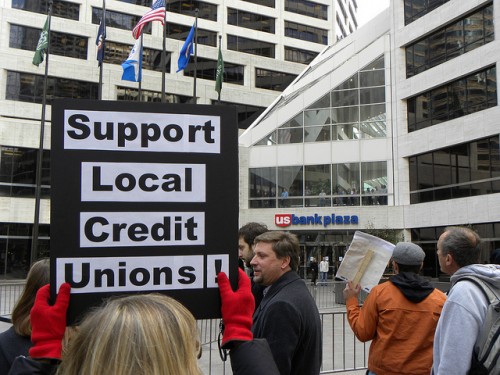
There is a lot to love about credit unions, especially when they’re compared to banks. They lack the huge conglomerate feel that many big banks have, and they often have a local flavor which lets them release a quirky video like this (can you imagine a wall street bank ever releasing an advertisement like that?)
Credit unions have continued to gain in popularity in the past decade as people switch from big banks. Still, there are many misconceptions out there about credit unions which have made some people wary of joining one. Below you’ll find 10 of the most common credit union myths and answers debunking those claims.
Too Many Membership Restrictions
Many people believe that it’s difficult to get an account at a credit union because they have overly complicated and detailed restrictions. However, this simply isn’t true. While credit unions did have a lot of membership restrictions when they first started popping up across the country, it’s fairly easy to sign up for a checking or savings account today. In fact, it’s almost as easy as singing up for those same accounts at a bank!
They Offer Fewer Services Than Banks
Most credit unions offer the same popular services that banks offer. So you can have a checking or savings account, online banking, loans, IRAs, and ATM cards. While large corporate banks may offer specialty services that you can’t find elsewhere, credit unions do offer the same popular services and accounts that almost all major banks offer.
Credit Unions Aren’t Insured
While credit unions aren’t insured by the FDIC like big banks are, they are insured in other ways. All credit unions are part of the National Credit Union Association. This is an association that provides the same amount of coverage and insurance for money deposited into credit unions that the FDIC provides for larger banks.
Credit Unions Aren’t Regulated
Credit unions are actually more strictly regulated than banks! Because credit unions are often small enough to fly under the radar of local and federal state governments, they have to practice stricter regulation when it comes to the money they handle. Credit unions are regulated using the same standards that are used on normal banks.
You Have to Pay to Join
In most cases you won’t have to pay to join a credit union, but you may have to have a checking or savings account with a minimum balance. When you join a credit union and deposit your money into an account, you essentially become a “co-owner” of that credit union. So while you do have to put down a certain amount (usually somewhere between $5 and $25) to open an account at some credit unions, you’re not actually paying a fee to join. When you decide to leave that credit union, you receive all your money back.
They Don’t Have Online Banking
In this day and age, almost every credit union has online banking! Very small credit unions might not have had online banking when they first opened years ago, but many of the credit unions you’ll find in your city or town will allow you access to online banking.
They’re Only Good for Local Banking
While many credit unions don’t have nationwide branches due to legal and compliance issues, your credit union can actually be used across the country as long as it is part of the Credit Union Service Centers. This is an organization that allows all you to access all applicable credit unions from any location. So if you live in New Hampshire and you’re in Texas, you can do your banking at a different credit union branch as long as that credit union and the one you typically use are part of the Credit Union Service Centers.
Only Employees of Certain Companies Can Use Credit Unions
This was true during the early years of credit unions when there weren’t a lot of people using credit unions. However, as credit union popularity grew, this was one restriction that fell away. While there are still some companies that have credit unions that only their employees can use, many local credit unions are open to anyone who wants to join.
Credit Unions Don’t Pay Taxes
Many people believe that credit unions are exempt from paying taxes because they are not-for-profit businesses (which means that their profits are returned to their customers in full). Credit unions actually pay local, property, and employer taxes. Their not-for-profit status does allow them to be exempt from paying federal taxes, however.
Credit Unions Are Just Like Banks
Credit unions are very different from banks! While they offer many similar products that banks offer, credit unions treat their customers and clients very differently. For one, you’re more likely to receive flexible service that allows you to customize services to your specific needs. For another thing, as a member and client of a credit union, you technically own part of the credit union and are allowed to have a say in the direction of the business. Because credit unions are not-for-profit, it means that all transactions are guaranteed to be returned to all credit union members in the form of low fees and great rates. Unlike banks, credit unions put people and their needs before money and shareholders.
(Photo courtesy of Fibonacci Blue)
Comments